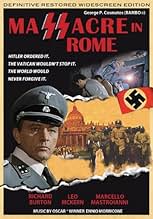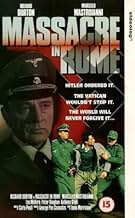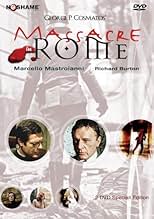IMDb रेटिंग
6.5/10
1.6 हज़ार
आपकी रेटिंग
अपनी भाषा में प्लॉट जोड़ेंRome, March 23, 1944: 33 German soldiers are killed by a bomb. Lt. Col. Herbert Kappler is ordered to execute ten times that many Italians.Rome, March 23, 1944: 33 German soldiers are killed by a bomb. Lt. Col. Herbert Kappler is ordered to execute ten times that many Italians.Rome, March 23, 1944: 33 German soldiers are killed by a bomb. Lt. Col. Herbert Kappler is ordered to execute ten times that many Italians.
- पुरस्कार
- 1 जीत और कुल 1 नामांकन
फ़ीचर्ड समीक्षाएं
This is a retelling of the events leading up to the Ardeatine Massacre, which took place just outside of Rome during World War Two, and the attempts to prevent it happening by various people involved.
The massacre was a direct response by the SS in retaliation for partisan bomb that was detonated in the middle of Rome while an SS company was marching through the city, and the order to kill ten men for every German soldier killed came direct from Adolf Hitler himself. There's a lot of controversy regarding the Vatican's knowledge about the event too, and the film does a good job of drawing attention to this without being completely accusatory.
Richard Burton plays Col. Keppler, a weary SS officer who loves Rome. Along with arrogant Prussian adjutant John Steiner, he knows that the Third Reich is ending and his main concern is that his name is announced by the BBC on their war crimes list that is broadcast every night. Burton seems genuinely concerned for the people of Rome, while Steiner just wants to save his arse. Marcello Mastroianni is the local priest involved in art restoration who strikes up an uneasy friendship with Burton, although conversation usually devolves into the two throwing veiled insults at each other. The Italian fascists want to celebrate the anniversary of fascism openly but Burton suggests that they do it behind doors, as Rome has become a bit of a ticking bomb politically. His commanding officer, old school General Leo McKern, plays down the possibility of an attack but then blames Burton when the entire company are blown away by partisans Giancarlo Prete and Renzo Palmer (both of whom speak perfect English, despite always being dubbed in any other film I've seen them in).
The film then becomes a kind of reverse Schindler's List as Burton must find ten men for every soldier killed - 320 in total. Burton at first adds all the political and condemned prisoners on the list, then all the jews, then anyone else he can find while both Steiner and Mastroianni separately contact the Vatican in order the step in and have the Pope try and prevent the massacre. Guess what happens there? Despite the avalanche of later Nazisplotation films Italy would dump on the world, this one is played one hundred percent straight with no over the top violence and nudity, just people acting their socks off. The most tense part of the film is when the partisans are waiting for the SS company to show up, as Giancarlo Prete constantly chases off the locals while trying to hide a bomb in his dust cart. Burton plays the burned-out SS soldier in a sympathetic way, but it's still hard to feel sorry for a guy who is basically preparing a list of people to be murdered. Steiner makes a mark as an officer who just oozes Prussian arrogance, and it's nice to see him in something a bit more serious than usual.
Of course, the Italians would take a huge dump on the memories of everyone in the war, and their own nefarious involvement in it, by making such films as Achtung! The Desert Tigers, Women's Camp 119, The Beast In Heat, Nazi Love Camp 27, SS Experiment Love Camp, Deported Women of the Special SS Section, The Red Nights of the Gestapo, The Gestapo's Last Orgy (aka Caligula Reincarnated as Hitler), SS Camp 5: Women's Hell, and Hitler's Last Train. You were on their side, you tw*ts!
Richard Burton plays Col. Keppler, a weary SS officer who loves Rome. Along with arrogant Prussian adjutant John Steiner, he knows that the Third Reich is ending and his main concern is that his name is announced by the BBC on their war crimes list that is broadcast every night. Burton seems genuinely concerned for the people of Rome, while Steiner just wants to save his arse. Marcello Mastroianni is the local priest involved in art restoration who strikes up an uneasy friendship with Burton, although conversation usually devolves into the two throwing veiled insults at each other. The Italian fascists want to celebrate the anniversary of fascism openly but Burton suggests that they do it behind doors, as Rome has become a bit of a ticking bomb politically. His commanding officer, old school General Leo McKern, plays down the possibility of an attack but then blames Burton when the entire company are blown away by partisans Giancarlo Prete and Renzo Palmer (both of whom speak perfect English, despite always being dubbed in any other film I've seen them in).
The film then becomes a kind of reverse Schindler's List as Burton must find ten men for every soldier killed - 320 in total. Burton at first adds all the political and condemned prisoners on the list, then all the jews, then anyone else he can find while both Steiner and Mastroianni separately contact the Vatican in order the step in and have the Pope try and prevent the massacre. Guess what happens there? Despite the avalanche of later Nazisplotation films Italy would dump on the world, this one is played one hundred percent straight with no over the top violence and nudity, just people acting their socks off. The most tense part of the film is when the partisans are waiting for the SS company to show up, as Giancarlo Prete constantly chases off the locals while trying to hide a bomb in his dust cart. Burton plays the burned-out SS soldier in a sympathetic way, but it's still hard to feel sorry for a guy who is basically preparing a list of people to be murdered. Steiner makes a mark as an officer who just oozes Prussian arrogance, and it's nice to see him in something a bit more serious than usual.
Of course, the Italians would take a huge dump on the memories of everyone in the war, and their own nefarious involvement in it, by making such films as Achtung! The Desert Tigers, Women's Camp 119, The Beast In Heat, Nazi Love Camp 27, SS Experiment Love Camp, Deported Women of the Special SS Section, The Red Nights of the Gestapo, The Gestapo's Last Orgy (aka Caligula Reincarnated as Hitler), SS Camp 5: Women's Hell, and Hitler's Last Train. You were on their side, you tw*ts!
This movie has a chilling subject matter, but there are a few too many unnecessary distractions along the way, which prevent it from getting down to the heart of the story as quickly as it should. It's still worth seeing, however, especially for fans of Richard Burton, who gives a compelling performance as a man caught in a mechanism that far surpasses him and forces him to do unthinkable deeds. And all this despite the obvious fact that Burton is miscast as a German officer with a distinctly British accent. (**1/2)
On paper a war movie by producer Carlo Ponti and the director of 'Rambo' doesn't sound at all promising; especially as it stars Richard Burton and Marcello Mastroianni, who had between them made probably more junk than any reputable pair of actors then alive. But as Burton burns the midnight oil while he and his colleagues attempt with mounting desperation to find 320 eligible candidates then in custody for summary execution in reprisal for a bomb attack by partisans the film (co.adapted by Robert Katz from his own 1967 book 'Death in Rome') probably does a better job of fulfilling Godard's declaration that the most harrowing account of a massacre would be one detailing the logistical nightmare it would be for the perpetrators than Costa-Govras's 'Section Speciale' a couple of years later.
Being an Italian production it boasts authentic location work in Rome itself, along with several familiar British faces in the supporting cast (including Peter Vaughn as Field Martial Kesselring, who later served five years for giving the nod to the whole ghastly business).
Being an Italian production it boasts authentic location work in Rome itself, along with several familiar British faces in the supporting cast (including Peter Vaughn as Field Martial Kesselring, who later served five years for giving the nod to the whole ghastly business).
If you pick this for striking scenes of violence,you'd do better to go elsewhere. What remains in my mind after watching it are the performances - especially Richard Burton and Peter Vaughn as soldiers resigned to taking and giving orders they'd rather not take and give - and the methodical way in which the reprisals are ordered, arranged and then carried out.
Every time I hear of some brutal crime, I wonder how it ever began, how people could commit such acts.
But this film gave me an understanding of the process whereby one act/decision leads to another, which leads to another... until there's no stopping it, even if anybody wanted to.
Every time I hear of some brutal crime, I wonder how it ever began, how people could commit such acts.
But this film gave me an understanding of the process whereby one act/decision leads to another, which leads to another... until there's no stopping it, even if anybody wanted to.
the film of a meet. between Richard Burton and Marcello Mastroianni.dramatic, impressive. but almost a documentary. first for the inability to give a large picture of the story. the Resistance group seems be a pretext or insignificant detail. the good intentions are more important than the story itself. sure, dramatic, admirable for the scenes of the executions and for the end, it has the basic sin to not convince. the story is touching but the characters are forms of sketches. the fight of Father Antonelli is reduced at noble speeches and an individual sacrifice. Richard Burton is prisoner of his role and each try to enlarge it seems be in vain. the generous purpose is more important than a coherent story made by different perspectives. and the last impression could be - it is a good film. the main argument - the meet between Maroianni and Burton.
क्या आपको पता है
- ट्रिवियाFilmed in the winter of 1972-73, the film had a limited release in the summer of 1975.
- गूफ़All of the SS officers in Kappler's Security Police headquarters are shown to be wearing the Knight's Cross of the Iron Cross, which was a high level decoration for valor and heroism in combat. It would have been highly unusual for so many security officers to have this award, since the Security Police dealt with "behind the lines" actions and not front line combat.
- भाव
Father Pietro Antonelli: I would prefer a world that didn't need protecting.
Lieutenant Colonel Herbert Kappler: And I would prefer a religion that didn't need priests.
- कनेक्शनReferenced in Escape to Athena: Cast and Crew Interviews (1978)
टॉप पसंद
रेटिंग देने के लिए साइन-इन करें और वैयक्तिकृत सुझावों के लिए वॉचलिस्ट करें
- How long is Massacre in Rome?Alexa द्वारा संचालित
विवरण
इस पेज में योगदान दें
किसी बदलाव का सुझाव दें या अनुपलब्ध कॉन्टेंट जोड़ें



































